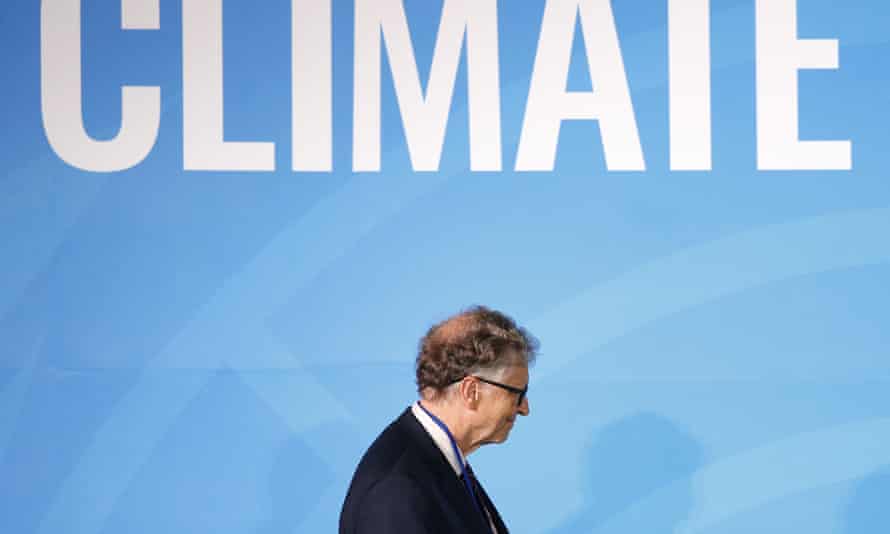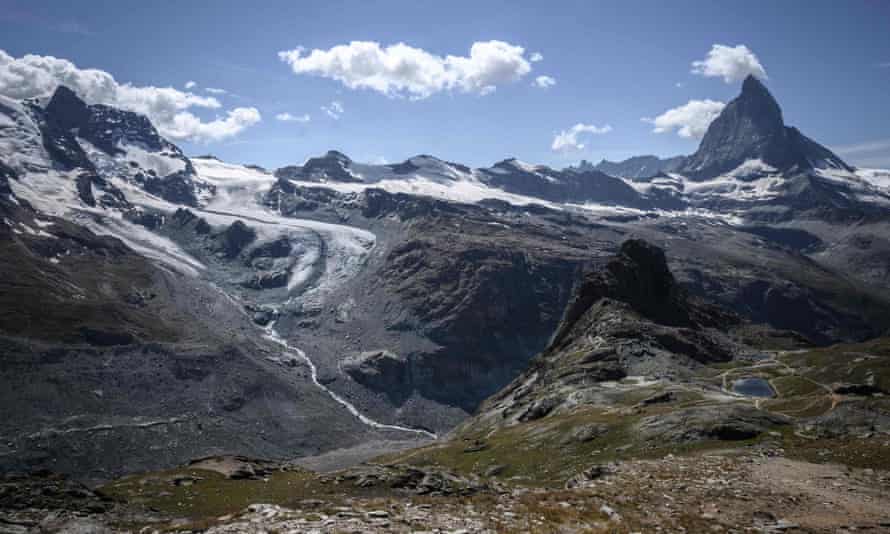How to Avoid a Climate Disaster by Bill Gates review – why science isn't enough
The co-founder of Microsoft looks to science and tech to end climate crisis ... but can nations cooperate?

Bill Gates has changed our lives through his Microsoft software; he has improved countless lives through his foundation’s work to eliminate polio, TB and malaria; and now he proposes to help save our lives by combating climate change.
How to Avoid a Climate Disaster details the transformation necessary to reverse the effects of decades of catastrophic practices. We need, Gates calculates, to remove 51bn tonnes of greenhouse gases from the atmosphere every year. Failing to do so would cost more than the 1.5 million lives already lost to Covid-19 and could cause, he calculates, five times more deaths than the Spanish flu a century ago.
Ever the technologist, Gates sets out a spreadsheet for getting rid of those 51bn tonnes of greenhouse gases and achieving net carbon zero emissions by 2050. We would need to use more renewables and fewer fossil fuels (which would account for roughly 27% of the reduction needed in emissions), and change how we manufacture our goods (31%), grow our food (18%), travel (16%), and keep our buildings warm or cool (6%).
To achieve this, Gates provides a set of measures that could, if the UK government is listening, be transposed point by point into the formal agenda for the this year’s 26th United Nations Climate Change Conference, Cop26, in Glasgow. He favours a green new deal, carbon pricing and heightened corporate responsibility. But Gates’s most important proposals involve new technologies. Just as his global health initiatives specialised in scientific solutions to combat disease – “show me a problem and I’d look for a technology to fix it”, he writes – his principal interest is in a technological breakthrough, the environmental equivalent of the Manhattan Project or the moon landing.
Gates is right about the scale and urgency of the problem. Global carbon emissions are now 65% higher than they were in 1990, and the term “global warming”, with its cosy overtones and accompanying stories of vintners making English and even Scottish champagne, does not adequately explain the intensity of storms, hurricanes, floods and severe droughts that are putting our planet on course to reach temperatures not seen in millions of years. Nor, as this book shows, does it satisfactorily reflect the biggest market failure in history and the most difficult global collective action problem the world has ever had to face.
Recognising that we cannot continue to deny electricity to 800 million of the world’s poorest people, his starting point is a plan to develop clean energy and cut its costs. Already, scientific advance has brought an astonishing reduction in the prices of solar, wind and wave energy, battery storage, electric vehicles, remote sensing monitoring and smart grids. But if we are to deliver affordable clean energy, we have to go much further. Gates demands what he calls “a renewable portfolio standard” of energy pricing and an immediate quintupling of climate-related research and development. This would include investing in nuclear fusion as well as nuclear fission; thermal energy (creating energy from hot rocks underground); carbon mineralisation; sea-based carbon removal to de-acidify the oceans; and direct air capture using scrubbing machines. Because even the most advanced solar panels currently convert only around a quarter of the sun’s energy, we need to address problems caused by the intermittency in the output of renewable energy, seasonal differences in its supply, and the high storage costs.
But we must also do more to capture emissions across the entire energy, transport and manufacturing sectors before they are released back to the atmosphere: to store them deep underground or in long-lived products such as concrete, or even by combining CO2 with calcium to produce limestone that could replace concrete.
Taken together these measures could meet the world’s objective of net carbon zero. But if politics was simply the application of reason and science to contemporary challenges, we might have not only solved the climate crisis by now but easily cured Covid-19 and other infectious diseases too.
So we have to ask why, when what needs to be done seems obvious, we have been so slow to act. And why, when it is more cost-effective for advanced economies to fund the total cost of mitigation and adaptation in the poorest countries than to suffer decades of worsening pollution, has the world simply failed to come together?
Gates clearly prefers science to politics – “I think more like an engineer than a political scientist” – and his touching, admirable faith in science and reason reminds me of a similar faith, this time in economic rationality, held by the great prewar economist John Maynard Keynes. His breakthrough in economic thinking offered a way out of the world depression and mass unemployment of the 1930s. But he was unable to persuade the political leaders of the day, and in frustration decried politics as “the survival of the unfittest”. “The difficulty lies not so much in developing new ideas as in escaping from old ones,” he concluded.
Gates is modest enough to say: “I don’t have a solution to the politics of climate change,” but he too knows that the solution he seeks is inextricably tied up in political decisions. Seemingly unanswerable scientific evidence can be torpedoed by powerful vested interests, or sidelined by bureaucratic indifference, or undermined by weak and incompetent political leaderships that make commitments they do not honour. Or they can be sabotaged by geopolitical rivalries or simply by nations clinging to old-fashioned and absolutist views of national sovereignty. As a result, the multilateral cooperation necessary to deal with a global problem does not emerge, and the very real tensions between economic and environmental priorities, and between the developed and developing world, go unresolved.
I look back on the Copenhagen climate change summit in 2009, when the UKand Europe’s enthusiasm for a deal failed to overcome both the reluctance of the US to make legally binding commitments, and the deep suspicion of China, India and the emerging economies of any obligations that they believed might threaten their development. So determined were they to avoid binding commitments that they rejected Europe’s offer to unilaterally bind itself to a 50% cut in its emissions. So bitter were the divisions that the Australian prime minister Kevin Rudd, who bravely stood out for an ambitious deal, exchanged an angry war of words with the Chinese negotiator.
The Paris accord of 2015 helped reverse many of the setbacks of Copenhagen. Agreement was reached on a global target: to prevent temperatures rising to 2 degrees above pre-industrial levels – preferably 1.5 degrees. And we created new obligations on each country to report, monitor and continuously review their emissions. And while we could not bind the major economies to precise commitments on carbon reductions, they agreed to a ratcheting up of their ambitions every five years.
The importance of Glasgow’s Cop26 in November is that it is the first of these “ratchet” points, and, with 70 countries already committed to net zero carbon emissions, it represents the best opportunity in years to make progress. It also comes at a time when the science is more definitive, the technology more cost-effective, and the price of inaction far clearer. What’s more, President Biden and his new climate envoy John Kerry are promising a renewal of American leadership, and corporations and cities are on board for change.

In addition to accepting Gates’s proposals for more funding of new technologies, I envisage advances in Glasgow on four major fronts. First, the globally coordinated fiscal stimulus we now need for a post-Covid economic recovery should have, at its heart, a green new deal, centred around a massive expansion in environmentally sustainable infrastructure and the creation of millions of much needed new jobs.
Second, new corporate laws should be agreed, to be applied worldwide, that ensure global companies disclose their carbon footprints, adopt impact-weighted accounting that would reveal the full environmental cost of their operations, and break with business-as-usual by publishing transition plans to a zero net carbon economy.
Third, we should advance the cause of carbon pricing by agreements to eliminate fossil fuel subsidies and by taking up Biden’s plan for border adjustment mechanisms that, for the first time, tax carbon-intensive imports and exports. And fourth, we could agree a big boost to nature-based solutions from afforestation to the better land use now championed by the World Resources Institute. In doing so we could finally make a reality of the promised $100bn green climate fund that was planned 10 years ago to collect and allocate payments for climate mitigation and adaptation in the developing world.
But to operationalise the Paris agreement – to limit warming to 1.5 degrees – requires countries to halve their CO2 emissions by 2030. So vested interests like big oil will have to be enlisted for change. The populist nationalist and protectionist rhetoric of irresponsible demagogues will have to be taken head on. And supporters of a stronger set of commitments will have to show why sharing sovereignty is in every nation’s self-interest, and that coordinated global action is indeed the only way to end the mismatch between the scale of the environmental problems we face and our current capacity to solve them. Success will come by demonstrating that the real power countries can wield to create a better world is not the power they can exercise over others but the power they can exercise with others.
How to Avoid a Climate Disaster: The Solutions We Have and the Breakthroughs We Need is published by Allen Lane. Gordon Brown’s Seven Ways to Change the World will be published by Simon & Schuster in June.


